Luanne Rice's Blog, page 7
September 6, 2016
It's Not the Where

Rough Point, Newport, Rhode Island
September 2016
Update: I wrote this essay two years ago. It's full of "place"--places I've lived, places I've felt depressed, places I've felt better. What I've learned is that "where" doesn't matter--depression is an illness that doesn't really care about geography. Right now I'm back in New England--the first photo shows a favorite bench, where I looked over the Atlantic Ocean and thought about this p.s. to the original piece and the reasons I wrote it. Here goes:
I'd felt my readers missed me--I had stopped blogging and posting on social media, but I sometimes read the messages, and I felt people's love and concern. So I wrote about what was going on, briefly published the essay here on my website, and then took it down. During the short time it was up, I received a lot of mail from people: some expressed worry about me, and others confided that they too had suffered depression. I was humbled to receive such outpourings from people I knew and loved and from total strangers.
Here is one thing I want you to know: I am better. Much better. The depression has lifted--maybe not forever, I've had it long enough to know that it stays around, often at a low level--but time has passed since I've felt the worst darkness. My first young adult novel was just published by Scholastic, and I'm having fun meeting young readers and introducing my long-time readers to YA. I still miss Maggie and Mae-Mae. Maisie is now 17, she's as feisty as ever, and she enjoys being with Emelina and Tim--especially Tim.
Another thing I want you to know: if you feel depressed, it's real. It's not a decision you make--"Oh, I think I'll just stay in bed today because I can't seem to move and my limbs seem full of sand and my eyes keep leaking tears." It's an illness, like diabetes, and it affects people of all ages, from all walks of life. I hope you can get help, as I have. Help is out there. Please look for it, ask for it. I want you to get better.
Love, Luanne
WHERE I’VE BEEN
Spring 2014
I was someone who blogged every day, who embraced Facebook quickly and whole-heartedly, but I've been quiet in those online places lately, and I thought I'd tell you a little about where I've been. I got depressed. Isn't that a strange sentence? "I got depressed," just the way someone would say, "I got seasick." Or "I got dressed." An illness, a state of affairs, a gigantic event came to me, landed on my head, squashed me. That was the effect, but at the time it was neither stark nor sudden.
It happened over time.
I can't even say, for certain, the precise moment it began. I know I was in California, in my pretty house overlooking the Pacific Ocean and the Santa Monica Mountains. I had moved there, after a lifetime on the East Coast, for reasons having to do with work, inspiration, nature, and the desire, at this stage of my life, to have an adventure. I saw myself learning to surf. I would definitely hike. I would write nonfiction along with my novels.
My cats and I headed west and moved in. The girls—Maggie, Mae-Mae, and Maisie—were sixteen, fifteen, and twelve. We had been together through everything from the death of my mother to the world's worst divorce, numerous book publications, the heartbreaking end to a long relationship with a wonderful publishing house, and a sea change of my outward life.
Maybe those big losses had caused me to seek even greater solitude, developing a strange aversion to being out after dark, to getting together with friends, so that I was hurting people's feelings by declining all invitations, so that I was most comfortable living at my desk, in the world of my characters. My cats were my family. They sat on my desk, made me laugh, soothed my tears.
We loved New York, had lived there, in Chelsea, for a long time. New York may be the perfect place for a particular kind of recluse—one who needs solitude to write and think, but who requires human connection that doesn't demand, necessitate, or even expect any commitment in return. Hello to the doorman, good morning to the super next door, black coffee thank you to the waiter at the diner, an hour with my beloved therapist, who knows me better than anyone and has since I was in my twenties. Then back home, upstairs to the apartment, to the cats and the characters.
The move to California came after several years of trips to Santa Monica. I had month-long stays in a favorite hotel without the cats, visits with great friends, one particular friendship so deep it felt like family. There was all that sunshine, the ocean, hikes in the canyons, and bougainvillea everywhere.
Nature, more than anything, pulled me. I am a person of more contradictions than consistencies, and one of them is that nothing sustains me more than nature, yet I have been an urban dweller for my entire adult life. When I was in California, I felt if not precisely happy, a different level of okay. I began to think this could be possible: a change, a big one.
I'd dealt with depression for a long time. It started in grade school where I would regularly miss over half of the school year's 180 days. We didn't know what to call it, but I know I was constantly on the edge of crying, and it gave me a sore throat. My father drank and sometimes didn't come home at night, and I'd kneel at the window as a sort of penance--I'm not sure for what--my bare knees hurting on the oak floor. When you're seven, or nine, or thirteen, and your prayers never come true, depression seems to find easy ways in.
I left my body when bad things happened or when I got too sad. Time would pass and I wouldn't remember what I did, what happened. I'd be wide awake, but then I'd wake up, as if I'd been asleep, as if life was a dream. I thought of it as "going away," and sometimes when I went away I became Blue or Leda, different names for the other girls inside me, the ones better able to cope with the pain, the sadness. Blue could fly and read other people's minds. Leda was feral and protective and wouldn't let anyone hurt me or get too close.
I had bad episodes of depression in college. I couldn't make myself go to classes, and I dropped out two years in a row. I never did graduate. When my father was dying I walked to the top of the Newport Bridge, planning to jump off, but a police car picked me up and dropped me at the base of the bridge, and the officer told me it wasn't safe to walk on it at night. He seemed to have no idea he'd stopped a suicide. Maybe the tears on my face hadn't been enough of a clue. All I know was I hadn't had the strength to walk up again--so he did save my life.
More recent depressions and a bad spell of dissociation landed me on Proctor 2, a trauma unit at McLean Hospital, in Belmont Massachusetts. The hospital is a haven, the staff are angels. They listened to me and nurtured me and made me strong enough to face life again.
But this particular depression, at least in the beginning, was different--it was more like sadness. Not incapacitating like the others, not filling me with the feeling that to end my life would be the best solution, just an ongoing heaviness in my heart, and I thought maybe California, a place that was very far from the pain, could take it away.
And for a while it did. After moving into my new house I worked on a novel. Writing has always been everything to me—a self-contained world at the desk, a life of words and dreams. I distinguish between writing and publishing. What happens after the work is handed in is another thing entirely; I know I have been very lucky.
California was three thousand miles from my sister and nieces, with whom I am very close. I wrote, of course, because that is what I do. One thing very different from New York City was that seeing people took effort. I had to get into my car for everything; it was more self-contained. Encounters felt more pointed, not just the casual hellos to the doorman and gallery owners and strangers on the street.
I saw my friends, but things were different now that I lived there. Perhaps a visit to California was safer in its closed-endedness. Residing there meant we could get together anytime, so our meetings were not so charged, special, imbued with the sense that I'd be leaving soon. We didn't make the same effort to see each other.
Craving solitude is a familiar state for me. I need to be alone like I need air. Waking up, I have a talismanic need not to speak out loud before writing. The Internet has required careful navigation: is email a conversation? If so, I can't do it before I write. I hold on to my dreams of the night before and let them carry me into the day's fiction. Whether I remember the details or not, just the feeling, the mood, the images of the dreams take me where I need to go. People get in the way of that. Cats don't. But being alone too much works against writing; a feeling of loneliness must be balanced, carefully, so it doesn't start to chip away, doesn't start to carve me up into someone who doesn't matter to others. Doesn't matter to myself. Doesn't matter at all.
Some northeasterners think there are no seasons in Southern California, but are. They are subtle, however. Over my two years there I watched the canyon turn golden in September, green in March. I heard the tree frogs start up in January. I saw the California gray whales migrate south in November, north—with calves—starting in February. I saw the bougainvillea in my yard bloom, then die. And the lemon trees bore flowers, then fruit. The cycle repeated.
The cats had always lived indoors. I never wanted them to get lost or hunted, and I didn't want them to kill birds. In California we had a garden, but small enough so I could see all four corners at once. I began to let the girls—my cats were all female—outside, one at a time.
Maggie was ancient and slow. We would sit on the enormous settee on the deck overlooking the canyon and ocean. It was covered with canvas the color of the ocean, and I called it "the blue thing." I would read, and she would sit still beside me and follow hawks and butterflies with her hunter's turquoise eyes. I never wanted to say one cat was my favorite, but she was mine. When she was a kitten she used to sleep on my chest; I would stay awake as long as I could, waiting to hear her purr. But she was feral, and she never learned that skill.
One day she began to die. She had lymphoma—the same disease that both my parents died from. I wanted to hold on to her forever. Knowing that that was impossible, understanding that all things must pass, that life is a circle, had no bearing on my emotions—I may have ascribed to those truths consciously, but inside I was about to start breaking apart. Maggie's death left me unhinged.
That spring Mae-Mae died—also of lymphoma. I buried her in the garden next to Maggie. One Saturday at dawn I drove down to the desert and volunteered with a group that supplies water to save the lives of border crossers. Laura, one of the founders, showed me a cross marking the spot where a woman had died of thirst. She showed me the note an anonymous person had left at one of the water barrels: “This water saved my life. God Bless. Sincerely, Lost."
After five hours in 105-degree heat, in a brutal landscape that stretches with nothing but rocks and dirt as far as the eye can see, I passed out from heat stroke and, I think, the shock of seeing that cross and realizing how impossible it seemed that anyone could live through it.
Once I hit the road I realized I couldn't safely drive myself home. I was shocked and sick at the closeness of death in the desert, at that level of human suffering. I checked into a hotel near San Diego. I made it home the next day. After that, depression took hold. Not just feeling sad anymore, not simply feeling a little too lonely: this was the real thing, the same depression I'd had as a child and later and that had landed me in the hospital. It was sickness. I felt despair—those words don't even cover it, though. I tasted chemicals—they were so strong, running through my bloodstream, I felt them in my brain, in my fingertips. I felt them in my heart.
Life was too hard. Love remained, but the beings, the objects of my love, were gone. They were dead. Had the move west been too much for my old cats? Had it been too much for me? Had I brought all of this on? I began to feel I had killed my two oldest girls. People died in the desert, looking for a better life. People died of thirst. I went crazy.
I was raised Catholic but left that religion a long time ago. When the Dalai Lama comes to New York I attend his talks and listen to his wisdom about impermanence and letting go. Sharon Salzberg's work on mindfulness and compassion has been inspiring. But when depression hit, none of the teaching, none of the time I've spent sitting, breathing, watching my discursive thoughts, noticing my grasping thoughts, allowing them to pass through my mind like clouds across the blue sky, helped.
I began to think of suicide again. I was planning. I researched ways to get Nembutal; I found a link for a place to go to in Mexico where I could obtain the medication that is no longer available here. Living on the Pacific coast, I had plenty of places in mind where I could go after dark—take the drugs and just disappear into a canyon. What stopped me was thinking of who might have to find me. And what it would do to my family. Being stuck in that place, wanting the pain to end but being unable to act, tormented me.
My writing stopped. That's like saying my breathing stopped. I pulled back from everyone even more than I had before. No more posting photos of cats and my garden on Facebook, no more writing a daily blog.
My longtime therapist saved me--as she's done before. Together we made a plan for me and Maisie to come home to New York, to the apartment that has been refuge for so many years. It felt empty—no Maggie, no Mae-Mae. I found tufts of those old girls' fur snagged on bookcases; a blue yarn octopus toy; a catnip apple; and all their favorite cans of food—each cat liked different flavors.
I resisted medication. In college a psychiatrist at the Institute of Living in Hartford, Connecticut, put me on high doses of amitriptyline. After one more recent hospitalization I was on a high-dose brew of Zoloft, Seroquel, Ativan, Remeron, and others. I have trouble sleeping, and those medications definitely put me to sleep. The thing was, they didn't stop depression. They might have dulled it, I'm not sure. I could feel it moving around like parasites under my skin. I felt encased—as if I was wearing pantyhose over my spirit. I hated the feeling, so I went off the meds cold turkey, without medical help, and went into the worst withdrawal imaginable. So I went back on some of them and stepped down, slowly. Eventually I found one that worked, and I still take it today.
I don't like to do things slowly, but sometimes I've had to. I want it all, all at once, forever and ever. Getting well has been like that. One step forward, one step back. Or is it two steps forward, one step back? I'm not sure. I just know I'm moving along, here in New York, writing and writing and writing. Writing came back right away. Sharing, being open, has been slower.
Some of my closest friends live states away. One, the writer Joe Monninger, tells me about his dog Laika. We talk about writing and life—mine in New York, his in New Hampshire. He is a fly fisherman, and loves nature the way I do. When he sees a flock of cedar waxwings on his crabapple tree, he lets me know. My sister Maureen calls me from Connecticut every night at six. Every night. I love her for that, and for everything.
My solitude is intact. It's not loneliness. Maisie is still with me. We have adopted two kittens, Tim and Emelina. It took a while for her to stop hissing and accept them, but they loved her from the beginning, and I can see that love has changed her. Later today I will take a break from writing and go downstairs to check the mail, and I'll step out for a coffee.
I'll look up at the blue sky. I can see it now, again.

The three originals-- Maggie, Maisie, and Mae-Mae in Chelsea.
June 9, 2016
My Other Family
When I was ten I joined a second family. Although I loved my own, one day after school I stumbled down a flight of stairs into the Whitneys' garden at 588 Lincoln Street, and fell in love with all of them. Mrs. Whitney was the most intrepid mother imaginable. She wasn't protective and introspective, internal and artistic like my own mom--she encouraged adventure, travel, and exquisite, borderline danger. She climbed the highest trees, taller than any rooftop, and I followed. She'd take the family skiing at Mad River Glen (whose motto is "Ski it if you Can") and like the Pied Piper led us all slicing down black diamonds--the iciest, most mogul-ridden trails on the mountain. She taught me to do backbends and back-walkovers, how to ride a bike no-handed, and how balance across a narrow ledge above a steep waterfall and not look down or be afraid. She told me stories about teaching in Panama, Switzerland, and New York, and she ordered me to find a way to live overseas at some point in my life. (Eventually I did--I moved to Paris.) She said that in Panama she'd take her students up on the school roof just to grab a bit of fresh air, and in New York she shared a small Gramercy Park apartment with another young woman and they'd dance the night away and have to prop their eyelids open to teach the next morning.
Mrs. Whitney (she wanted me to call her Betty Anne, and it was a hard transition--she was of another generation; in fact, as she put it, she was my other mother, and since I couldn't call her "Mom," having one of my own, I had long since settled on "Mrs. Whitney") and I stayed close throughout life. When I dropped out of college for depression, she gave me Sibelius and James Galway records and told me cross-country skiing would help me, that I would feel more alive in the cold, gliding over the snow. After she sold the house in New Britain (the year the twins were born the family had moved to 655 Lincoln, conveniently just across the street from us,) she relocated to St. Simon's Island and became a bookseller at G.J. Ford Bookshop. She instantly became part of the community, and she loved recommending books and hearing what everyone was reading. They invited me down for a signing several years ago, and I loved seeing her in action. When I ran into Mary Jane Reed, the store owner, at Winter Institute earlier this year, we hugged and tearfully had a Betty Anne Whitney moment--it was the first time we'd seen each other since she died.
That was something I couldn't face at the time. Death is part of life, and Betty Anne was decidedly unsentimental about it. But losing someone so important to me, a person who was integral--I'd call her every week, or she'd call me, we'd laugh and cry about everything, she'd help me make sense of the vagaries of relationships, and more than anyone she'd celebrate my books--the writing of them, their publications, she was as proud as my real mother was before she died--was seriously impossible to bear. I dealt with it in a very private way, and for a while it was too hard to talk to the other people who had loved her so. Including, and especially...her four children.

A Whitney-esque day at the beach.
See, they are the other part of my other family. To say I adore them is an understatement. I babysat them every single day after school from when I was ten until I went to college. Tobin was already born when I started, and I held Sam the day she came home from the hospital. The twins, Sarah and Palmer, were the sweetest, and I couldn't put Sarah down--I carried her everywhere, and her mother used to joke she was glued to my hip. Tobin has always been graceful and thoughtful, a caring teacher at a school for the deaf, Sarah is director of alumni relations at St. Joseph University, Palmer is a successful businessman who shares his dad's love of sailing. All have amazing families.
Yesterday I had the most wonderful visit from Sam. She and her three children are on vacation, staying in a hobbit house in Topanga. We spent the day together, and in typical Whitney-fashion this involved climbing on the craggiest, steepest, most precarious rocks, taunting surf that was smashing against the cliffs, and finding a restaurant that allowed for running around after dinner because there is so much energy. We also needed books, because this is a majorly reading family. Sadie, my goddaughter, is an epic reader and a talented writer, Annie loves all books and gave me several fantastic book reports as we scrambled up to lifeguard station #3, and Tobin knows every spell in Harry Potter and also beat me very skillfully in a ruthless game of Dots.

Sam, Sadie, Annie, Tobin, and Sam's old babysitter
And Sam...how to describe how much I love her? She is an inspiration to me. A Telemark skier, a back country hiker and camper, the most caring woman ever. She went to Tibet with One Heart, to bring life-saving childbirth practices to the women there, she and her sister Sarah worked with Mother Teresa in Calcutta, and she is now a nurse-midwife for the most at-risk moms and babies in Salt Lake City. In DREAM COUNTRY I called her "the best midwife in the west," and she is.

Quintessential Sam.
Oh, how life comes around. I grew up babysitting Sam, and now she has great kids of her own. I feel so lucky to have them in my life. I love that they are as daring as their grandmother would want them to be, and also that they are readers of the first magnitude.

Two of the young readers.
April 24, 2016
Thank you, Yeats
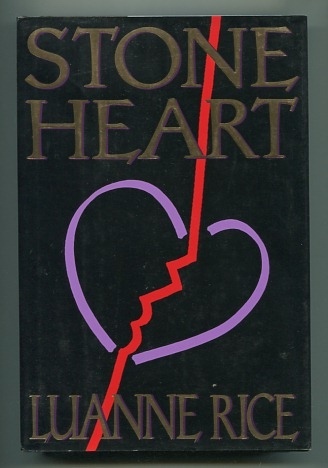
Today is the 100th anniversary of the Easter Rising in Ireland. While I was writing my novel Stone Heart, Brendan Gill told me to reread "Easter, 1916" by Yeats. I thank him, and Yeats, for that, because the title was inspired by a line in the poem: "Too long a sacrifice can make a stone of the heart."
My family is Irish on both sides, and I grew up hearing that family members had fought that day. (Most Irish people seem to have heard that.) Maybe it's true. All I know is that the poem is true, and so is that particular line, not just in the context of Ireland, but in all human suffering. Peace and love.
April 22, 2016
Earth Day
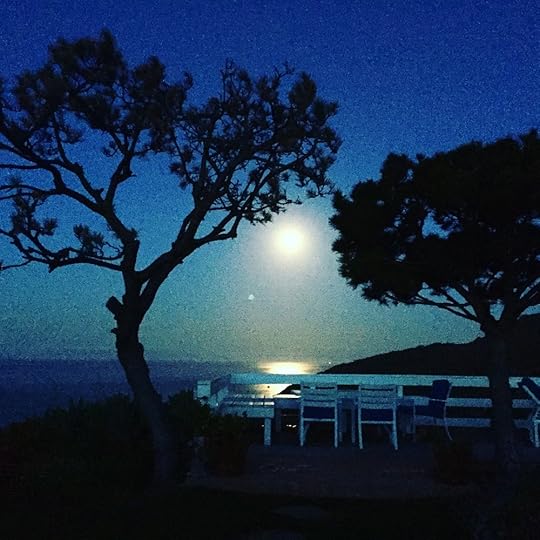
Moonset before dawn, Earth Day 2016
Just before dawn today, Earth Day 2016, I took this photo of moonset over the Pacific Ocean and the Santa Monica Mountains. In 1970, when the first Earth Day occurred, I was a sophomore in high school. I didn't know the word "environmentalist," but I'd always been one. I believed in conservation. As a little kid I'd joined the National Wildlife Federation and been a big fan of Ranger Rick. I'd walk the beach with my grandmother and a neighbor, picking up litter. For my science project in eighth grade I made a movie with my family's super 8 camera showing pollution along the Connecticut shoreline and in the Connecticut River. I always loved nature and felt it was the responsibility of all of us to protect it.
Back then the sky got cloudy and our eyes stung with smog--everyone used unleaded gas to fill the tanks of their...well, tanks. Big cars with big engines. Many rivers and lakes were filled with toxic sludge, some salt water coves were unsafe for swimming or fishing. Rachel Carson had written the wonderful and prescient Silent Spring in 1962, catching on with readers, and starting to raise the awareness. In 1969 there was a blowout at Platform A in the Santa Barbara Channel, causing a devastating oil spill that destroyed marine life--including over three thousand sea and shore birds--along the mainland and in the pristine environment of the Channel Islands.
All of this led to the creation of Earth Day. Shortly after, the Environmental Protection Agency was created, and the Endangered Species, Clean Air and Clean Water acts were passed. Luckily, very belatedly, awareness about our environment has continued to grow, but some people still live in the dark ages and want to cut back on protections while denying climate change.
Much more hearteningly, there are people and organizations writing and working to save protect the planet--wildlife, habitat, the oceans, the land, the air, and humans--including my friend Carl Safina and the Safina Center. And, I hope, many of you reading this.
Love, Luanne
March 25, 2016
A Day of YA at the NYPL
A week ago I was at the New York Public Library, doing a panel for the NYC Teen Author Festival. This was great and illuminating for me in so many ways. First, the NYPL. My favorite building in New York, a haven for readers and writers, its wide front steps facing Fifth Avenue and guarded by lions Patience and Fortitude. As a young writer, before having a book published, I spent countless hours in the reading room (because my apartment was too small/cold/dark, pick one or all) writing and doing research. Little did I ever suspect that one day I'd have a book published and be on a panel there, right there in the library, with wonderful writers.
But mainly it was great because of the people involved. David Levithan moderated the panel on perspectives. I sat on the stage with fellow YA novelists Francisco Stork, Beth Kephart, and Carolyn Mackler. Our discussion revolved around these questions (from David) and a few more besides:
What perspective do we, as adults, bring to our novels when we write about teenagers? How do we balance what we know and what our characters don’t? Why do we find ourselves revisiting these years, and what do we learn (even years later) by writing about them? How do you acknowledge the darkness without robbing the reader of finding any light? In this candid conversation, we’ll talk to four acclaimed authors about being an adult and writing about teenagers.
The conversation was so thoughtful and I learned a lot from and about my co-panelists. One thing that seemed clear about all of us is that we draw on experience but use our imaginations, and that we write from our hearts. I know that my heart was very full the whole time--I felt very supported by David ( fabulous writer as well as editorial director at Scholastic) and Aimee Friedman--my extraordinarily brilliant and nurturing editor who also writes gorgeous novels--sitting up close in the audience. They have shepherded me into the world of YA after my whole life spent writing general fiction, adult novels. (I never called them adult novels before, and it sounds vaguely racy, but it's necessary to differentiate my other novels from this young adult one, THE SECRET LANGUAGE OF SISTERS.)
Also in the audience was my forever literary agent Andrea Cirillo and many of her colleagues, all of whom I adore, from the Jane Rotrosen Agency. Later Andrea, Chris, Rebecca, Danielle, Amy, Julianne, Jessica and I went around the corner to the Bryant Park Grill to have a drink and debrief. We sat outside under heaters (it was very early March chilly) surrounded by trees wrapped in twinkling lights. Andrea and I have been in Bryant Park so often--with my former and beloved editors from Bantam, for literary festivals like New York is Book Country, and last spring we made a fast trip to see the Chuck-Will's-Widow, a first for that park.
It was a great day. I may be a week late in blogging about it, but I'm still thinking about last Friday, turning it over in my mind, all the marvelous moments.
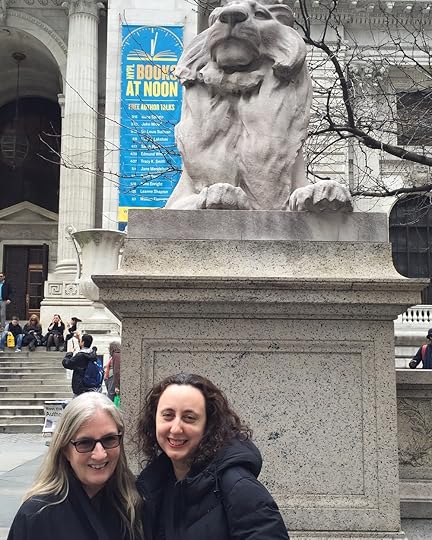
With Aimee Friedman in front of Fortitude at the NYPL.

My wonderful agent Andrea Cirillo and from right, Rebecca Scherer, Julianne Tinari, Chris Prestia, me, Amy Tannenbaum, Danielle Sickles, and Jessica Errera--lovely geniuses and part of my amazing team at JRA.
March 22, 2016
Top Holiday Reads Shortlist for 2016
I was so thrilled to learn that THE LEMON ORCHARD has been included in the Top Holiday Reads Shortlist for 2016! When informing me, Sophie Hart of Co-operative Travel (part of the Thomas Cook Group) said, "We felt that this romantic and captivating story would be the perfect thing to lose yourself in whilst relaxing on vacation, and it more than deserves a spot on the list." What an honor!
"Whilst!" "Shortlist!" To some of my American readers "Holiday Reads" will mean Christmas, or should I say Yuletide. But they also know that in Britain "holiday" refers to vacation, summer or otherwise, and that means they should pack THE LEMON ORCHARD in their beach bags when off to Martha's Vineyard, St. Tropez, Old Lyme, Watch Hill, Marbella, Biarritz, Ile de Ré, Mackinac Island, Chincoteague, Malibu--where the novel is set--or their own back yard. Think porch swing! Fireflies! A lantern to read by...
The article begins, "Are you heading off on your dream holiday this year? There’s nothing like having a great book with you on your travels to flop down in the shade and relax with. So, to help you find your perfect literary holiday companion, we’ve put together our 2016 shortlist of the very best holiday reads ranging from fiery romances to tense thrillers. What’s more, we’ve also asked our featured authors to tell us in 140 characters or less what their perfect holiday would look like!"
I had fun deciding what my perfect holiday would be. There are so many possibilities! Having a picnic with my family at Hubbard's Point, strolling along the Seine and trying to decide where to have my next café experience, walking the beach anywhere with my feet in the salt water, spending my birthday in Venice under the arbor at Locanda Montin, taking a ferry through Norwegian fjords into the Arctic to see the Northern Lights.
But I chose something different. To see what I said in a tweet-length 140 characters, you'll have to read the marvelous article and check out all the other wonderful books included on the list. Before you do, maybe you'd like to guess my dream holiday. Even better, please comment below, or tweet and tag me at @LuanneRice, and tell me your own perfect holiday--in 140 characters. I'd love to know.
And whatever you do this summer, have the best holiday ever, and don't forget to take along a book!

February 20, 2016
Hello, new website!
Just in time for the publication of THE SECRET LANGUAGE OF SISTERS (Tuesday! February 23!) I have a brand new website. I thank Adrian Kinloch, my long-time web person, for creating this one, and the last one, and the one before that. He really caught the vibe of the book, and I'm excited to unveil and share the site with you.
There are so many parts of the novel that I want to tell you about. First of all, the sisters, Tilly and Roo. They are beach girls--they grew up at a magical beach on Long Island Sound (Hubbard's Point, familiar to those who've read me before)--and they're closer than close. Although they have great friends, they know that sisters are the best friends ever. (This comes from my mother saying to my two sisters and me, "You'll have many friends, but you'll only have two sisters.") There's a boy--of course there's a boy, it's the beach--and he's Newton, your basic adorable geek that Roo has loved forever.
The sisters' closeness is challenged when the worst thing possible happens--Roo has a car accident that Tilly is partly responsible for, and everything changes. Roo's drastic condition, locked-in syndrome, causes her to be a total prisoner of her own body, even while her mind is as alert and agile as ever, and no one knows she's in there. Tilly's guilt tears her up, makes concentration and school impossible, and drives her to get so close to Newton that...well, talk about guilt multiplied. But there's redemption. Tilly is still the only one Roo can trust to figure it out, know she's not in a coma, not in a vegetative state, but in something else.
There's more. There are beach walks, and starry nights, and first kisses, and owls. Yes, there are owls. And a wise old woman who lives in a blue house with a pink door and who knows what it means to be a true sister forever, through the best and the worst. She may or may not have special, witchy powers.
I loved writing this novel. Can you love your characters too much? If so, that might have been the case here. I cried when I wrote about Tilly and Roo because I know what they feel for each other. They love each other, but they don't do it perfectly. That's the big secret of relationships--no one does it perfectly. You keep your eyes open and let it all in--love, fear, pain--and you don't push it away. You feel it as deeply as you can, and it guides you. You try to be there for the other person. On bad days, you fail miserably. But on good days--on most days?--you hold her hand, cheer her on, help her take baby steps then big steps then run the marathon, you give her hope and a reason to live. And in doing so you give yourself hope. You already have a reason to live, but congratulations: you've just discovered the secret of life.
Love. It's not just a feeling. It's an action.
January 26, 2016
Winter Institute
 Winter Institute is amazing and what a joy it was to spend time with independent booksellers. I was invited by my wonderful publisher, Scholastic (book fairs! book clubs! Harry Potter! The Hunger Games!) to join the party in Denver CO and talk about my first YA novel, The Secret Language of Sisters.
Winter Institute is amazing and what a joy it was to spend time with independent booksellers. I was invited by my wonderful publisher, Scholastic (book fairs! book clubs! Harry Potter! The Hunger Games!) to join the party in Denver CO and talk about my first YA novel, The Secret Language of Sisters.
My fellow authors were Sharon Robinson (great writer, daughter of Jackie, my mother’s idol) and Derek Anderson (amazing artist and writer of picture books) and we celebrated the fact that writing for children (in my case teenagers) is a very special calling. Their warmth and welcome into this new world for me made me feel so lucky. On top of that, we were taken care of, introduced, and nurtured by Scholastic’s inimitable Bess Braswell and Jennifer Abbots.
We all gathered for the Scholastic Meet & Treat After Party at Kevin Taylor’s at the Opera House. It was gorgeous, and there were stars on the ceiling! Constellations, twinkling overhead. There was an ice cream sundae extravaganza and a french fry station, and who could ask for more? Bess Braswell introduced all of us, and Sharon, Derek, and I gave talks, and the Caitlin Baker of University Books in Seattle spoke for author Goldy Moldavsky who was snowbound on the blizzardy East Coast.
I felt so grateful to be among book people. My heart literally swelled with love. When I spoke, I thanked the booksellers and told this story:
Here’s one reason I love booksellers…one February my event occurred on the same night as a big snowstorm. Hawley Cooke had advertised, there were posters of my book in the window, but…no one came. Well, actually one person did—a former employee of my literary agency who’d moved to Kentucky for grad school. I felt embarrassed and so bad for the bookstore, but Arlene Morse, the store manager, sat with me at the table piled high with my books, talking to me and making me feel as if I was the most important writer in the world. She had me sign stock, and the next day I was off to another city. But I’ll never forget her warmth and kindness, her reassurance that my book and I mattered, and her promise that she’d hand-sell it. And she did.
I mentioned other bookstores, all that have supported me from the beginning and along the way. Spending time with independent booksellers reminded me of what a collaborative effort it is. Writers write, we need publishers to believe in us and turn our work into books, and we are so lucky when the booksellers embrace us and put our books into the hands of readers.
The evening had so many high points. One was when I mentioned Connecticut bookstore RJ Julia (my home bookstore along with Bank Square Books and diesel: a bookstore) and the room applauded (Roxanne Coady and her store are innovators in and pillars of the independent bookseller world.) Another was running into Laura Cummings of White Birch Books. She reminded me of the first time we met, at a bookseller’s dinner in the wonderful Bantam days, when Harlan Coben and I were the featured authors. She told me (and I blushed) that she felt we were rock stars. As a New Hampshire bookseller she knows Joe Monninger very well and told me she loved our book The Letters. (Joe has also written many YA novels, including the classic Whippoorwill, and is a true spirit guide as well as a great old friend.)
Perhaps most touching of all was seeing Mary Jane Reed, owner of GJ Ford on St. Simons Island GA. For many years my “other mother” Betty Anne Whitney (I babysat for her four children and hung around the house every day because I loved BA–and the kids–so) sold books there. At about age 75, having relocated from New Britain CT to the island, Betty Anne walked into the bookstore, introduced herself to Mary Jane, and in typical BA fashion said forcefully with no room for doubt, “You need me to work here.” Mary Jane got her vibe perfectly, hired her, and loved her. Betty Anne worked at the store until four days before she died in September 2014.
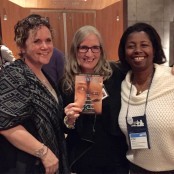 Toward the evening’s end I met two wonderful, lovely, and enthusiastic booksellers, Suzanne of Page 158 Books in Wake Forest NC and Kim of Between the Lines Bookstore in Baton Rouge LA. Our meeting was brief but intense and meaningful. They are both relatively new owners, and I wish them so much luck and happiness. Extra salutes to Kim, who is also a US Army officer.
Toward the evening’s end I met two wonderful, lovely, and enthusiastic booksellers, Suzanne of Page 158 Books in Wake Forest NC and Kim of Between the Lines Bookstore in Baton Rouge LA. Our meeting was brief but intense and meaningful. They are both relatively new owners, and I wish them so much luck and happiness. Extra salutes to Kim, who is also a US Army officer.
I feel incredibly grateful to Scholastic, to bookseller friends old and new, and to the American Booksellers Association. The beauty of a long writing career is how many great friendships are made along the way, and I felt it so deeply at Winter Institute in Denver. I look forward to the publication of The Secret Language of Sisters.
Thank you and love, Luanne xx
August 12, 2015
The Secret Language of Sisters
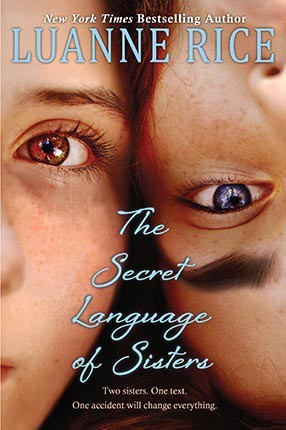 I’m thrilled to introduce my first young adult novel. I’ve always loved writing from the perspective of teenagers, especially sisters, especially at Hubbard’s Point…writing this novel really took me back to the beach and so much more. Luanne
I’m thrilled to introduce my first young adult novel. I’ve always loved writing from the perspective of teenagers, especially sisters, especially at Hubbard’s Point…writing this novel really took me back to the beach and so much more. Luanne
When Ruth Anne (Roo) McCabe responds to a text message while she’s driving, her life as she knows it ends. The car flips, and Roo winds up in a hospital bed, paralyzed. Silent. Everyone thinks she’s in a coma, but Roo has “locked-in syndrome”—she can see and hear and understand everything around her, but no one knows it. She’s trapped inside her own body, screaming to be heard.
Mathilda (Tilly) is Roo’s sister, and best friend. She was the one who texted Roo, and inadvertently caused the accident. Now, Tilly must grapple with her overwhelming guilt, and her growing feelings for Roo’s boyfriend, Newton — the only other person who seems to get what Tilly is going through.
But Tilly might be the only person who can solve the mystery of her sister’s condition—who can see through Roo’s silence to the truth underneath.
Somehow, through medicine or miracles, will both sisters find a way to heal?
Told from alternating perspectives, this gorgeous, unputdownable story of love, hope, and redemption marks bestselling author Luanne Rice’s dazzling entry into the world of YA.
The Secret Language of Sisters will be published February 23, 2015 and is available for pre-order now.
IndieBound Amazon Barnes & Noble iBooks Google Kobo Books-A-Million
July 31, 2015
Once in a Blue Moon
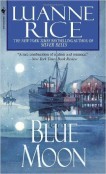 A blue moon is a celestial rarity and occurs when there are two full moons in one calendar month–such as the one today. It refers not to the color of the moon, but to the wonder. The title of my fifth novel (first published in 1993) is a play on that, and refers to the rare, once-in-a-lifetime love between Sheila and Eddie, the matriarch and patriarch of the Keating family.
A blue moon is a celestial rarity and occurs when there are two full moons in one calendar month–such as the one today. It refers not to the color of the moon, but to the wonder. The title of my fifth novel (first published in 1993) is a play on that, and refers to the rare, once-in-a-lifetime love between Sheila and Eddie, the matriarch and patriarch of the Keating family.
The title also refers to a long-disappeared section of sailor’s bars and nefarious doings in Newport, Rhode Island. The name “Sheila” was inspired by Sheila Dingley Mularski, one of my favorite little girls, who has grown up to be a Title One reading teacher, working with 10-12 year olds. Her school has a small library, but no librarian, so Sheila started volunteering her lunch hour to help kids check out books. Could we take a moment of appreciation for Sheila as well as your own favorite teachers and librarians, people who encourage and celebrate reading?
I have very happy memories about the publication of Blue Moon… The Happy Carrot had just opened in Old Lyme, Connecticut. It was a wonderful independent bookstore owned by Paulette Zander, and this was the first reading she’d hosted. She decorated the store windows in such a mystical way, full of blue moon-inspired art, and it was the first of many great book events we would have together.
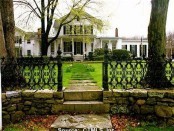 My launch party was held at the Old Lyme Inn–then owned by my dear friend Diana Atwood Johnson, who ran it like an artists’ retreat and literary salon (she’s an artist herself, I was honored to introduce her at last summer’s exhibition of her bird photographs at the Lyme Academy College of Fine Arts.) For the Blue Moon party she served blue cocktails and seafood delicacies. In the novel, Shore Dinners were served at the Keating family restaurant, and Diana outdid herself recreating the lobster-and-clam-bakes cooked by the Keatings. She decorated the inn so beautifully, and we invited old and new friends. I remember being totally surprised and delighted to look up and see the Reducers, a band I love, walk into this classic New England inn in all their black leather punk glory.
My launch party was held at the Old Lyme Inn–then owned by my dear friend Diana Atwood Johnson, who ran it like an artists’ retreat and literary salon (she’s an artist herself, I was honored to introduce her at last summer’s exhibition of her bird photographs at the Lyme Academy College of Fine Arts.) For the Blue Moon party she served blue cocktails and seafood delicacies. In the novel, Shore Dinners were served at the Keating family restaurant, and Diana outdid herself recreating the lobster-and-clam-bakes cooked by the Keatings. She decorated the inn so beautifully, and we invited old and new friends. I remember being totally surprised and delighted to look up and see the Reducers, a band I love, walk into this classic New England inn in all their black leather punk glory.
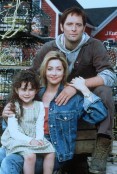
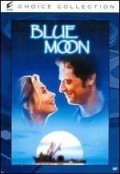
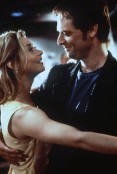
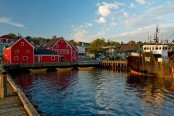 Blue Moon was later made into a CBS Movie of the week. It starred Sharon Lawrence, Jeffrey Nordling, Kim Hunter, Richard Kiley, and Hallie Kate Eisenberg, and was filmed in Lunenburg, Nova Scotia.
Blue Moon was later made into a CBS Movie of the week. It starred Sharon Lawrence, Jeffrey Nordling, Kim Hunter, Richard Kiley, and Hallie Kate Eisenberg, and was filmed in Lunenburg, Nova Scotia.
Happy memories…I am glad for the chance to share them with you. The sky does inspire me. I hope you look up tonight and all nights and enjoy what you see…



